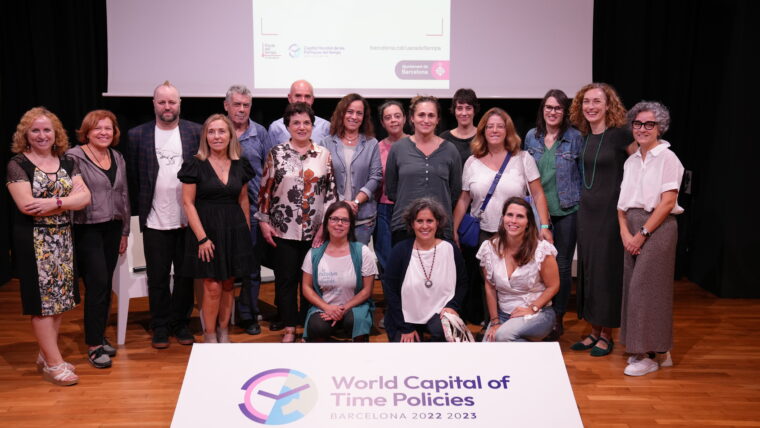Representatives of entities from all over the city meet to put "Barcelona on time".

» The meeting was attended by the Councilor for Health, Aging and Care, Gemma Tarafa and the municipal manager, Sara Berbel, as well as more than 65 entities that shared their experiences promoting healthier, more egalitarian, efficient and sustainable uses of time.
The day began by showing the story of a typical day in a single-parent family, the problems that citizens of Barcelona face every day to find time for everything. And the lack of time to do everything you want to do, was one of the central themes of the event.
In a television interview format, conducted by Romina Vallès, Gemma Tarafa and Sara Berbel shared with the audience how to find this balance between all the times of life was also a public policy issue, and how the Barcelona City Council is carrying out a range of actions to move towards the right to time.
Gemma Tarafa highlighted the closer and more humane urban planning with projects such as super islands or open courtyards, or actions for a care system that supports caregivers. She also highlighted the Caregiver Card, a project launched this September that brings together services for caregivers and, among other measures, includes respite spaces for caregivers. However, as the councilor also pointed out, “we all need to take action to advance towards the right to time, and that is why all the entities that are here today are so important”.
There was also a space to talk about the World Capital of Time Policies, a title that Barcelona will hold in 2022, and for which the city has held various actions to raise awareness among citizens and has organized meetings with other municipalities and regions on time policies.
In the interview, Sara Berbel detailed the main novelties of this year’s Time Pact, highlighting the conceptual change of speaking of the right to time as a right of citizenship, as well as introducing the concept of time poverty, proposed by the United Nations and used for search groups around the world. Both concepts make it possible to measure, on the one hand, the needs of different social groups in terms of time, and on the other, to guide policies to make the right to time effective.
It has also highlighted the inclusion of the axis time and sustainable city. According to Sara Berbel, “this axis, which should be important, is gaining strength with the creation of hybrid work models that are changing mobility and the time we dedicate to it”.
The event was also an opportunity to present and bring together the members who are joining the group promoting the Pact of Time: Catalan Association of Youth Professionals (ACPI), Catalan Association of Care Resources (ACRA), Federated Associations of Families of Students of Catalonia (aFFac), Association of Cultural Management Professionals of Catalonia (APGCC), Health and Social Consortium of Catalonia, Environmental Space and Viu el Teatre.
During the event, the practices of very different entities were presented, such as the Asociación Salud y Familia, with the project Tiempo reencontrado, aimed at women in vulnerable situations; or the experience of Cataliza, with training programs aimed at adults in aspects related to the uses of time.
Experiences in improving internal organization were also presented, such as that of ASENCAT, an organization that organizes senior volunteers and has implemented various measures to respect the time of its employees and volunteers. ITEREM, member of the driving group of the NUST Network, has also shared some of the key measures that have been implemented since its inception, and that make it a benchmark in time organization.
In the field of sustainability, the experience of Barcelona Activa was presented, which has developed travel plans for its employees, successfully promoting active travel for its employees, successfully promoting active travel. And within the scope of the Barcelona City Council, the new services offered for the Virtual Office of Attention to Citizens, which reduce the need to move to interact with the City Council and save time for all citizens.
In the third sector, the program to offer respite space to families with children with multiple disabilities, offered by the Nexe Foundation, was presented, as well as the main results of the study on time and participation of neighborhood organizations, developed for the Federation of Neighborhood Associations of Barcelona.
Sonia Ruiz, Director of Gender Services and Time Policies of the Barcelona City Council, also presented the extension of the advisory service to companies on equality issues to include the uses of time.
The day ended with a poem by Adriana Beltran, The fourth side of the triangle, and a networking space where the Time Pact entities were able to strengthen ties and discuss new ways to move towards healthier, more egalitarian, efficient and sustainable uses of time.





